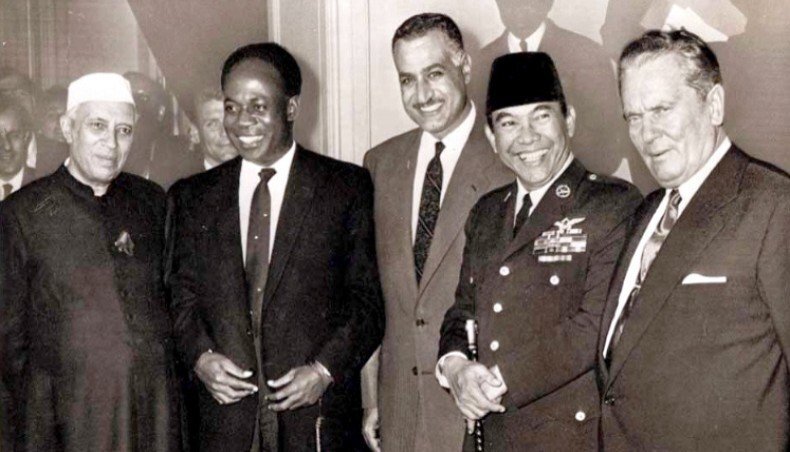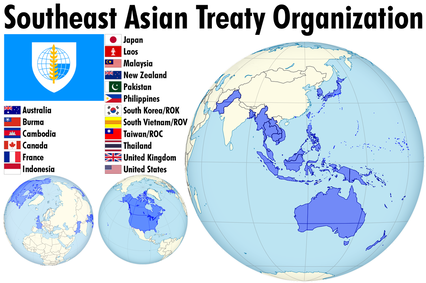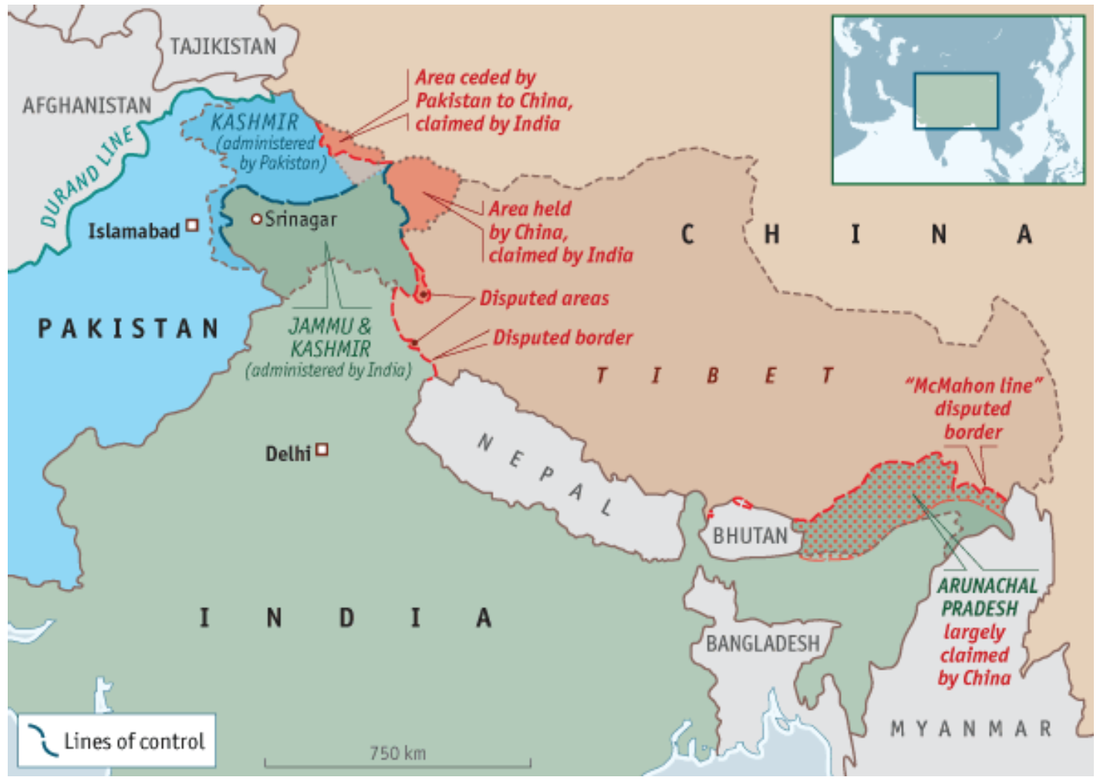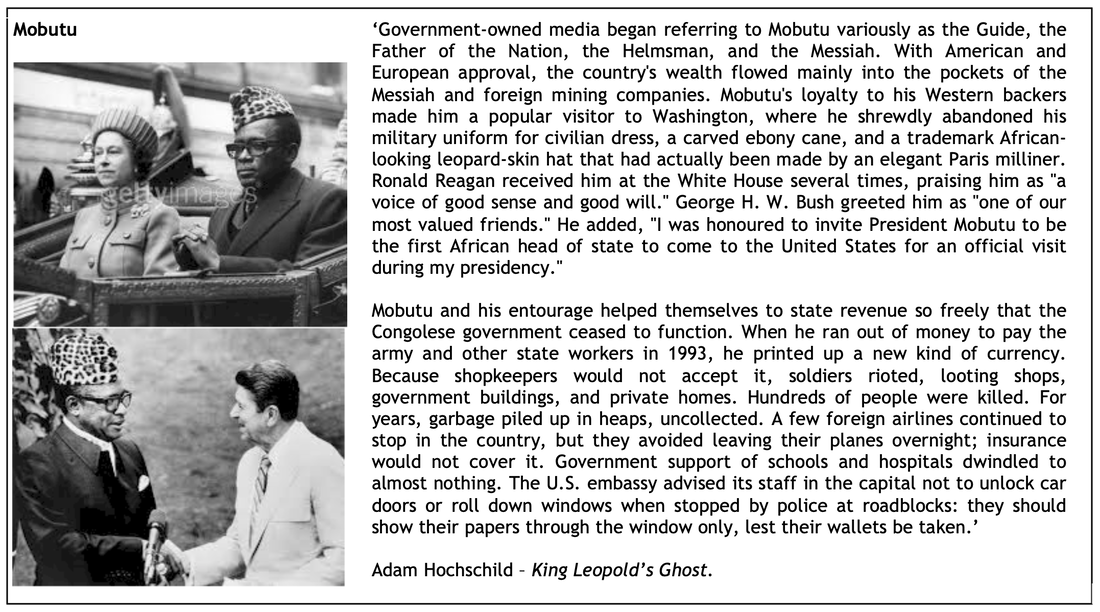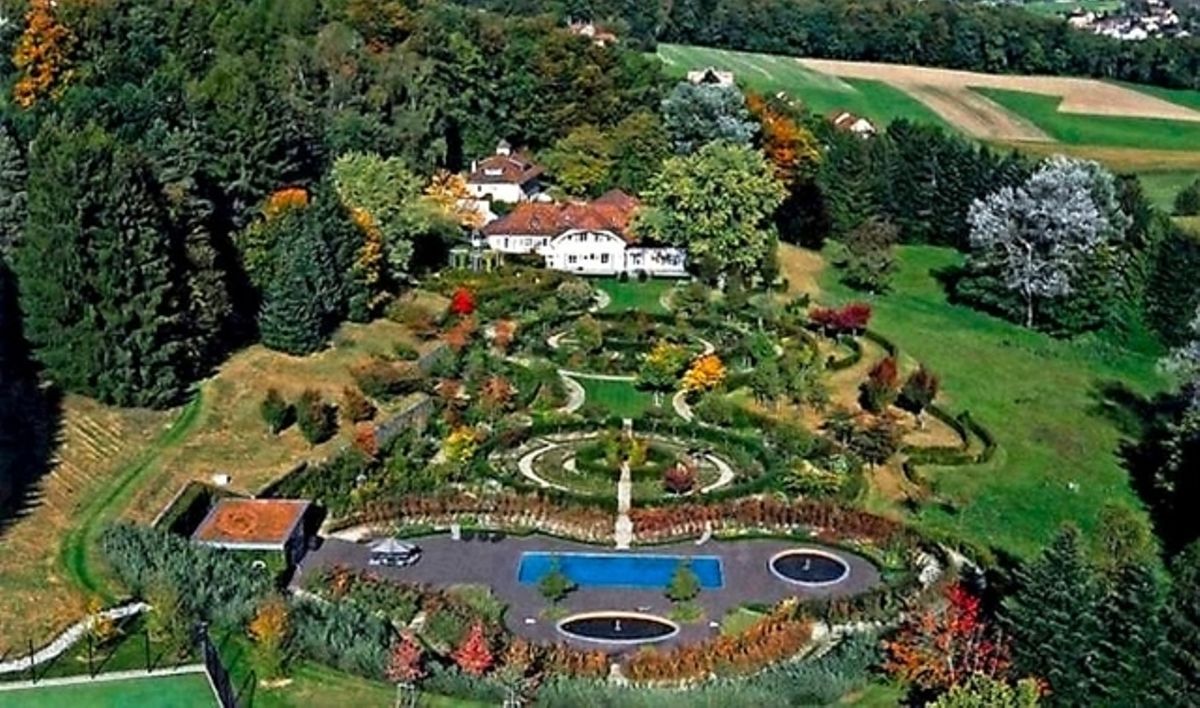Lesson 3 - Three case studies in the consequences of decolonisation: India (negotiated), Indo-China (violent) and the Congo (accelerated).
In this third and last lesson on decolonisation, we'll look at what happened in our case study states after decolonisation. The devastating impact of the Cold War on Indo-China has already been examined in our study of the Vietnam War.
One of the questions to bear in mind as we consider the consequences of decolonisation is whether the nature of decolonisation – violent, negotiated and accelerated – influenced the nature of the post-colonial development of newly independent states? Or were other factors such as the nature of previous colonial rule, the Cold War, geographical factors or socio-economic development more important? With our study of the Vietnam War we have already examined both the international context and domestic consequences of decolonisation in Indo-China. Which factor or factors do you consider to have been most influential in explaining how Vietnam developed after independence from France in 1954?
Today we're going to focus on India and the Congo.
One of the questions to bear in mind as we consider the consequences of decolonisation is whether the nature of decolonisation – violent, negotiated and accelerated – influenced the nature of the post-colonial development of newly independent states? Or were other factors such as the nature of previous colonial rule, the Cold War, geographical factors or socio-economic development more important? With our study of the Vietnam War we have already examined both the international context and domestic consequences of decolonisation in Indo-China. Which factor or factors do you consider to have been most influential in explaining how Vietnam developed after independence from France in 1954?
Today we're going to focus on India and the Congo.
|
India
When India became independent in August 1947, it retained its dominion status in the Commonwealth until its constitution was agreed and a republic was declared in 1950. The new constitution of 1950 made India a secular and a democratic state. It has a Hindu majority, a large Muslim minority, and numerous other religious minorities including Sikhs and Christians. From the 1950s to the 1980s, India followed socialist-inspired policies. The Parliament passed extensive reforms that increased the legal rights of women in Hindu society. Nehru advocated a strong initiative to enrol India's children to complete primary education, and thousands of schools were founded across the nation. |
|
Nehru advocated a socialist model for the economy of India — no taxation for Indian farmers, minimum wage and benefits for workers, and the nationalisation of heavy industries such as steel, aviation, shipping, electricity and mining. An extensive public works and industrialisation campaign resulted in the construction of major dams, irrigation canals, roads, thermal and hydroelectric power stations. Although Nehru denied he had any nuclear ambitions for India, Canada and France aided India in the development of nuclear power stations for electricity. Relations with the United States grew strained and India signed a 20-year treaty of friendship with the Soviet Union - breaking explicitly for the first time from non-alignment (see below). In 1974, India tested its first nuclear weapon in the desert of Rajasthan. The economy was extensively regulated, with protectionism and public ownership; this led to pervasive corruption and slow economic growth. Beginning in 1991, significant economic reforms have transformed India into the third largest and one of the fastest-growing economies in the world. India has also fought a total of four wars/military conflicts with its rival nation Pakistan. In the Indo-Pakistani War of 1947 fought over disputed territory of Kashmir. In the Indo-Pakistani War of 1965 India attacked Pakistan on all fronts after attempts by Pakistani troops to infiltrate into Indian controlled Kashmir. In 1961, after continual petitions for a peaceful handover, India invaded and annexed the Portuguese colony of Goa on the west coast of India
Non-aligned Movement
While India was part of the Commonwealth, Nehru always said that India would ‘follow an independent policy, keeping away from the power politics of groups aligned one against another'. This became the basis of the policy of non-alignment and the foundation of the Non-aligned Movement. Nehru wanted India and other South-East Asian countries to stay outside the power blocs of the Cold War between the US and the USSR. For example, India backed Communist China to get a seat in the Security Council (instead of Taiwan) in opposition to the British position. India opposed the partition of Palestine and the 1956 invasion of the Sinai by Israel, Britain and France, but did not oppose the Chinese direct control over Tibet and the suppression of a pro-democracy movement in Hungary by the Soviet Union. In developing the non-aligned policy, Nehru was the main organiser of the Bandung Afro-Asian Conference in 1955.
While India was part of the Commonwealth, Nehru always said that India would ‘follow an independent policy, keeping away from the power politics of groups aligned one against another'. This became the basis of the policy of non-alignment and the foundation of the Non-aligned Movement. Nehru wanted India and other South-East Asian countries to stay outside the power blocs of the Cold War between the US and the USSR. For example, India backed Communist China to get a seat in the Security Council (instead of Taiwan) in opposition to the British position. India opposed the partition of Palestine and the 1956 invasion of the Sinai by Israel, Britain and France, but did not oppose the Chinese direct control over Tibet and the suppression of a pro-democracy movement in Hungary by the Soviet Union. In developing the non-aligned policy, Nehru was the main organiser of the Bandung Afro-Asian Conference in 1955.
|
The Bandung conference (image right shows Nehru with Nkrumah of Ghana, Nasser of Egypt and Sukarno of Indonesia) denounced colonialism, criticised the Cold War and demanded that commodity prices be fixed to protect the producers in developing countries. This resulted in a loose grouping of non-aligned states. Nehru's efforts here were backed by Nasser of Egypt and Tito of Yugoslavia. It led to a clash with Britain over its invasion of the Suez Canal in 1956, as Nehru looked on this as the continuation of British imperialism. Nehru and the Non-aligned Movement pressed for economic development of Third World countries. However, his independent position in relation to the US and Britain was shattered by the lndian border war with China in October 1962, when India had to accept significant military aid from Britain.
|
Pakistan
When Pakistan gained its independence in August 1947, the country remained a dominion of the Commonwealth. The constitution of 1956 led to Pakistan declaring itself an Islamic republic with the adoption of parliamentary democratic system of government. The constitution transformed the Governor-General of Pakistan into President of Pakistan but the democratic system was stalled by a series of military dictatorships. In 1970, Pakistan held its first democratic elections since independence, that were meant to mark a transition from military rule to democracy, but the military establishment refused to hand over power.
When Pakistan gained its independence in August 1947, the country remained a dominion of the Commonwealth. The constitution of 1956 led to Pakistan declaring itself an Islamic republic with the adoption of parliamentary democratic system of government. The constitution transformed the Governor-General of Pakistan into President of Pakistan but the democratic system was stalled by a series of military dictatorships. In 1970, Pakistan held its first democratic elections since independence, that were meant to mark a transition from military rule to democracy, but the military establishment refused to hand over power.
|
Pakistan developed a closer relationship than India with Britain and the West. Pakistan was under pressure from the much stronger India over Kashmir, so it looked to the West for support. Pakistan retained British officials in the civil service and in military positions. Britain also supplied its military equipment and officer training Because of its location south of the Soviet Union and its conflict with India, Pakistan was drawn into the Cold War. It formed the South-east Asia Treaty Organisation (SEATO) along with Britain, the USA and other countries to combat the spread of Communism. It also formed the Central Treaty Organisation (CENTO) in 1955 along with Britain and Middle Eastern countries, again to contain Communism.
|
The quality of relations with Britain gradually declined in the 1960s. Pakistan felt that Britain was more favourable to India in the continuing conflict between itself and India. This came to a head in 1972, when Pakistan left the Commonwealth (it did not re-join until 1989). Pakistan had been divided between West Pakistan and East Pakistan at independence. The people of East Pakistan felt neglected and dominated by the ruling classes of West Pakistan. This led to East Pakistan declaring independence and a major war with West Pakistan. East Pakistan (Bangladesh) won its independence when it was supported by India.
Democracy again returned from 1972 to 1977 under leftist Ali Bhutto, until he was vanquished by General Zia, who became the country's third military president. Pakistan's secular policies were replaced by the new Islamic Sharia legal code, which increased religious influences on the civil service and the military. With the death of President Zia in 1988, the new general elections announced the victory of PPP led by Benazir Bhutto as the country's first female Prime Minister. In 1999 coup d'état saw the restoration of military dictatorship in which General Pervez Musharraf assumed executive powers. Pakistan embarked on ambitiously developing the nuclear deterrence in 1972. Accelerated in response to first nuclear test by India in 1974, this program was completed in 1979. From 1977–88, President Zia's initiatives led to Pakistan becoming one of the fastest-growing economies in South Asia. While consolidating the nuclear development, increasing Islamisation and the rise home-grown conservative philosophy, Pakistan also helped subsidise and distribute U.S. resources to factions of the mujahideen against the USSR's intervention in communist Afghanistan.
The situation today
Democracy again returned from 1972 to 1977 under leftist Ali Bhutto, until he was vanquished by General Zia, who became the country's third military president. Pakistan's secular policies were replaced by the new Islamic Sharia legal code, which increased religious influences on the civil service and the military. With the death of President Zia in 1988, the new general elections announced the victory of PPP led by Benazir Bhutto as the country's first female Prime Minister. In 1999 coup d'état saw the restoration of military dictatorship in which General Pervez Musharraf assumed executive powers. Pakistan embarked on ambitiously developing the nuclear deterrence in 1972. Accelerated in response to first nuclear test by India in 1974, this program was completed in 1979. From 1977–88, President Zia's initiatives led to Pakistan becoming one of the fastest-growing economies in South Asia. While consolidating the nuclear development, increasing Islamisation and the rise home-grown conservative philosophy, Pakistan also helped subsidise and distribute U.S. resources to factions of the mujahideen against the USSR's intervention in communist Afghanistan.
The situation today
The Congo
When Mobutu became a dictator in 1965, all opposition was brutally crushed. Not so much a single party state or just a military dictatorship, Mobuto’s regime is perhaps best categorized as a ‘Personalist dictatorship’. In this form of authoritarian regime, the dictator may come from a military background or be the leader of a party, but neither political party nor military are independent of the will of the dictator, who often chooses the political elite from trusted family members or friends. Over three decades his dictatorship ransacked the state to the point of collapse, hardly distinguishing between the states’ and his own family's expenditure. A new word had to be invented in political taxonomy to describe the regime: ‘kleptocracy’, a form of political and government corruption where the government exists to increase the personal wealth and political power of its officials and the ruling class at the expense of the wider population.
|
Mobutu was helped when the price of copper increased in world markets. He decided to increase the export tax and later nationalised the assets of Union Miniere. The failure of the government to run the mining company effectively forced it to work with another Belgian company to run the mines on behalf of the government. Other than his own extravagant personal expenditure, Mobutu also spent the money on huge development projects - a steel mill, a hydroelectric dam, power lines and manufacturing plants. He also attracted foreign investment to the Congo. Mobutu wanted to make the Congo more African, so he changed its name to Zaire and changed the name of its cities. For example, Leopoldville became Kinshasa. He also changed his own name to Sese Seko.
|
|
The nature of his regime has been likened to a surreal ‘Alice-in-Wonderland universe’. (Michaela Wrong, In the Footsteps of Mr Kurtz) Mobuto believed he was in the tradition of African chiefs. This gave him great power and he developed a personality cult as the Father of the Nation. Mobutu became notorious for corruption, nepotism, and the embezzlement of between from US$4–15 billion in his time as ruler. Extravagances included having his own runway built to accommodate his privately chartered Concorde to fly him on shopping trips to Paris. He maintained his rule through a brutal policy of ‘divide and conquer’ over all potential rivals, where torture and execution were conducted before a live audience. Most distinctive was the creation of ‘Mobutism’ and a personality cult which forbade reference to any other government members by name and projected his face descending from the heavens, before the evening’s television news.
|
(Above) Mobutu's villa in Savigny (Switzerland)
|
|
|
Mobutu developed good relations with the US. He was on the payroll of the CIA before he took over and he continued to keep his CIA links. He maintained the Congo as a pro-Western country in the centre of Africa. Belgian historian Jean Philippe Peemans has argued that decolonisation, far from freeing Belgium from her former colony, left her with an 'imperial hang over.' Beyond 1960 Belgian companies remained heavily invested in Zaire in neo-colonial relationships. These, and the continuance of governmental aid to the Mobutu dictatorship, were heavily criticised by the radical sectors of the Belgian public. On balance, Peemans considers the Belgian economy lost more than it gained from post-colonial investment in Zaire. This was because it could have invested more profitably elsewhere in the global economy, notably in Europe.
|
The United States and the West have been criticized for standing by while a nation suffered three decades of assault and robbery. During the Cold War years they turned a blind eye to President Mobutu's excesses because he was seen as a buffer against the spread of communism in Africa, and in particular, in neighbouring Angola. Only when the Cold War ended did human rights matter.
|
|
|
But by then President Mobutu had amassed a fortune and Zaire was spent. However, the collapse of world copper prices in 1990 reduced a personal income that the World Bank estimated had been worth $400 million per year through the 1980s. Inflation increased, there were fuel shortages and debts grew quickly. The civil service collapsed and hospitals and schools closed because there was no pay. By the end of the 1980s, the Congo was 'a rotting carcass', its economy virtually in ruins. But Mobutu remained in power because he bought the loyalty of key military and police units with increased pay and perks. Mobutu was finally forced from power by the Democratic Alliance forces of Laurent Kabila, a former associate of Lumumba's in 1997. In these last years of his life he was regularly in Lausanne, Mobutu got treatment at the CHUV, and typically stayed at the Beau-Rivage Hotel. (see short archive film opposite).
Activity
In pairs complete the overview revision table on the consequences of decolonisation. You can download the table here. This will not be a detailed document, but should allow you to make some overall comparative judgments about the post colonial experiences of our three case-studies of decolonisation.
In pairs complete the overview revision table on the consequences of decolonisation. You can download the table here. This will not be a detailed document, but should allow you to make some overall comparative judgments about the post colonial experiences of our three case-studies of decolonisation.
Extension and conclusion.
Having studied imperialism, the industrial revolution, the Cold War and decolonisation (in English, with a British teacher) where are we now? What conclusions can be reached? Watch this brilliant lecture by Oxford geographer Danny Dorling. Amongst the typical comments on YouTube is 'I wish I had been taught this at school'. Well, over the last three years, you were. I hope you find it useful.
Having studied imperialism, the industrial revolution, the Cold War and decolonisation (in English, with a British teacher) where are we now? What conclusions can be reached? Watch this brilliant lecture by Oxford geographer Danny Dorling. Amongst the typical comments on YouTube is 'I wish I had been taught this at school'. Well, over the last three years, you were. I hope you find it useful.
|
|
|

